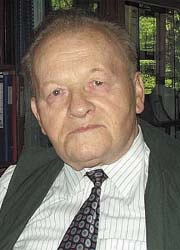Breakthrough in lymphatic cancer treatment
By EH Czech Republic correspondent Rostislav Kuklik
Celebrating his 71st birthday this year, Czech chemist Professor Antonin Holy will also be able to celebrate the launch of clinical testing of a drug to treat non-Hodgkins Lymphoma (NHL) and chronic lymphatic leukaemia (CLL) - adding another to his 60+ registered patents.

For these new trials, his research is again backed by the American bio-pharmaceutical firm Gilead Sciences; in the past, the professor and his team produced Viread, also commercialised by Gilead, to treat HIV/AIDS.
Three Czech research teams led by the professor and Dr Ivan Votruba, at the Institute of Organic Chemistry and Biochemistry (UOCHB), and Dr Berta Otov, from the 1st Faculty of Medicine, Charles University in Prague (1. LFUK), co-operated on the development of the new anticancer drug. Pre-clinical tests produced unbelievable results - it took only a week and one injection of the substance, named GS9219, and malignant cervical and abdominal lymphatic tumours in animals disappeared.
The uniqueness of GS9219 lies in the fact that, unlike chemotherapy in which normal immune cells are destroyed along with the cancer cells, this drug attacks tumour cells, but not normal cells.
GS9212 is a ‘double pro-drug’ of phosphomethoxyethylguanine (PMEG) nucleotide analogue. Actually this PMEG nucleotide analogue had been synthesized in the UOCHB, where the research team discovered its extraordinary anticancer potential. However, the molecule needed to be safely transported directly in to cancer cells. This is where Gilead Sciences came on the scene.
Gilead successfully created a formula for GS9212 so that it enters the cancerous cell, and undergoes hydrolytic conversion to an intermediary metabolic product called cPrPMEDAP, which is further de-aminated and turns into an active PMEG compound. Once inside the cell, PMEG is phosphorylated and acquires the ability to be incorporated into nucleic acid strain in the form of a nucleotide analogue. This insertion makes the DNA molecule replication defective, and the cancer cell dies soon afterwards.
Dr Zdenek Havlas, Director of Institute of organic chemistry and biochemistry, said: ‘We have no idea yet why our drug acts upon malignant cells only; once we know why it is so, we will be able to treat cancer effectively.’
Gilead Sciences was involved in this research from the beginning, and announced the scientific results during the American Association on Cancer Research (AACR) meeting earlier this year.
The clinical trial of the GS9212 compound will involve several thousand patients in the USA, at a cost of around a billion US$. This drug could reach the market in 5-8 years.
26.06.2007





